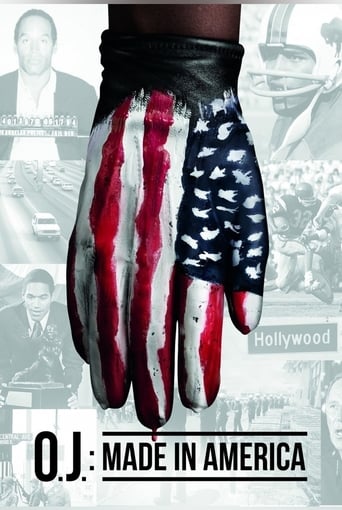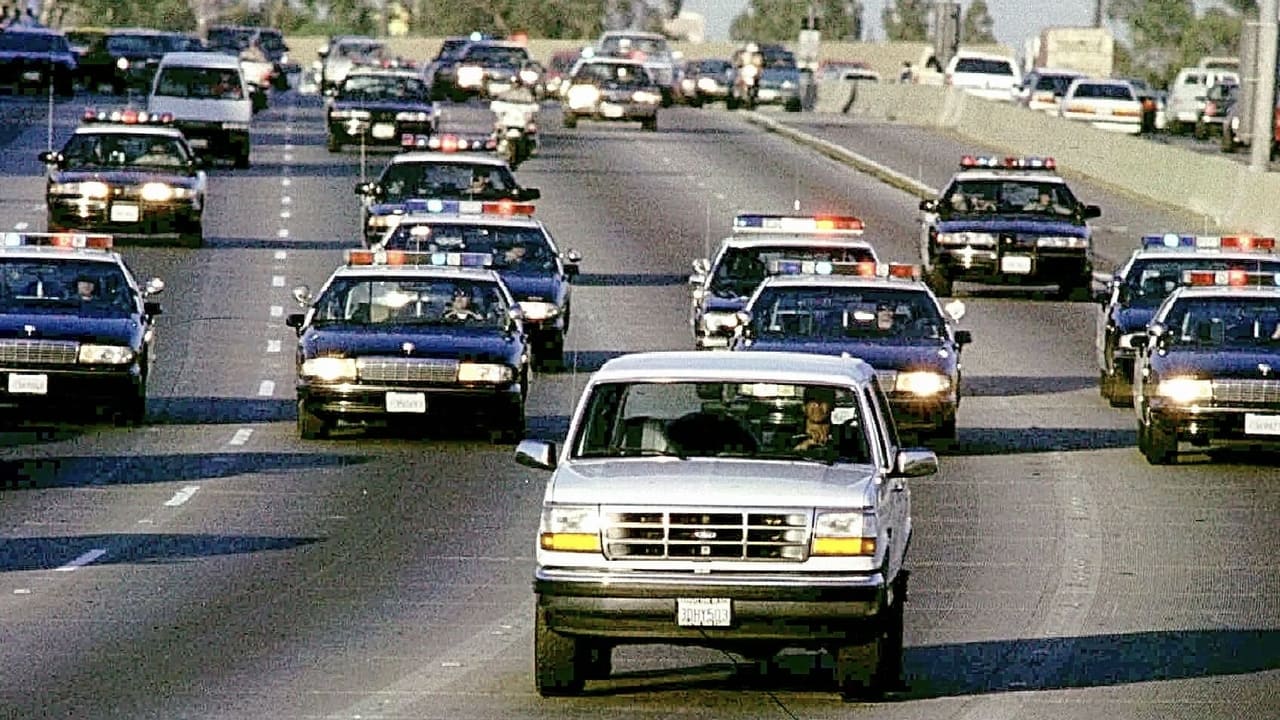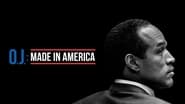davideo-2
STAR RATING: ***** Saturday Night **** Friday Night *** Friday Morning ** Sunday Night * Monday Morning O.J. Simpson had it all: fame, fortune and adoration by millions of fans, a sporting icon on a par with Muhammed Ali or Joe Frazier. He had travelled from the ghetto to the open arms of Los Angeles, where his prowess on the football field amazed everyone, playing a big part in winning the UCLA 1967 football tournament. He broke through the racial divide of the time, and was accepted into the predominantly white society, taking him away from the troubles and upheavals that the majority of African Americans were caught up in in America at the time. Whilst Ali took a stand by refusing to fight in Vietnam, and two black American athletes were sent home for making a black power gesture, he soaked up the celebrity lifestyle, detaching himself completely. As his football career drew to a close, he began a relationship with white waitress Nicole Brown, after his first marriage had collapsed, which got everyone talking, but masked a volatile and destructive home life, which would result in a double homicide.And so began the 'trial of the century', with a massive sports icon on trial. But the very thing that O.J. had ignored on his way up, would be the very thing that saved him on his way down. In the late 80s and early 90s, L.A. was once again in the grip of a massive race war, with the African American community getting caught up in various episodes of excessive force from the police and instances of individual injustice, culminating in the acquittal of several white police officers in the heavy beating of Rodney King. With a heavy blow, the predominantly black jury swung their revenge, and O.J. was set free. But afterwards, his life descended into a tawdry, degrading mess, where he ended up finding himself caught up in a robbery at gunpoint in a Las Vegas hotel room that did result in his incarceration.I still feel too young to be having distant memories, but the trial of O.J. Simpson is one thing I do remember from far back during the summer of 1995, while I was on holiday in Florida as an eleven year old kid, to his earth shattering acquittal when I was back on these shores. Even at such a young age, I, like many others, was astonished at his getting freed when all the evidence quite clearly pointed to his guilt, but this served to highlight the mind blowing power of money and celebrity, and the incredulous fortunes it can afford you. With such a dark cloud hanging over his head, Simpson has never been allowed to fade into the background, popping up here and there as a point of interest. Filmmaker Ezra Edelman has produced this ultra thorough, in-depth dissection of the man, through his calculated rise to the top as a member of an oppressed community, through to the false image of a devoted husband despite the turbulent home life, and his worrying lack of emotion after Nicole's death.Even in the days when epic, large scale productions were the norm, seven and a half hours would have been a massive ask for anyone, so it's best if you prepare yourself in advance and strap yourself in for the course, but luckily it's all broken into three parts, and the payoff is an absorbing, thoroughly engrossing production, that leaves absolutely no stone unturned and leaves you feeling as though you've been on a journey in film like absolutely nothing else you've seen before. *****
vostf
I couldn't wait to watch this acclaimed documentary since I had only a superficial understanding of what happened during the 1995 trial. At the time of the resounding 'Not guilty' verdict I remember thinking that in America money could buy you out of prison even with overwhelming evidence against you.Ezra Edelman's documentary brilliantly adds maximum perspective to the original verdict. That OJ Simpson was, at heart, a man from the ghetto who would talk himself out of most situations (even if that meant leaving his buddies behind to save his neck) and as a man who reneged on his roots to enjoy the high life as the equal to other affluent (white) people. This last point is essential since this makes playing the 'race card' during the criminal trial even more outrageous (if that is indeed possible), but it also explains that the man was so obsessed with his image that he became just a big psychotic narcissist: an affable successful man in public and an extremely insecure (jealous and paranoid towards others but in denial about himself) thus prone to bursts of violent rage in his private life.The documentary also does a great job of describing the history of LAPD abuses against minorities. Simpson's defence posse eventually tried to connect this ugly context with the criminal case. Actually it was enough for the jury (already prejudiced in favour of Simpson) to think there was at least a reasonable doubt that all the evidence pointing at OJ's unmistakable guilt was not reliable. Which is silly because the defence strategy was about describing a litany of hypothetical doubts, not proving any actual weaknesses in the prosecutor's case, and wrap it under the argument that the LAPD has a history of gross misconduct against black people.As good as the documentary is presenting the facts, giving us a fascinating insight into the so-called "Trial of the Century", I felt I lacked something. I mean the 'Non-Guilty' verdict is even more disturbing after this comprehensive review. You just cannot believe that the "race card" just won the case. So I went on the read Vincent Bugliosi analysis of the trial (Outrage, the 5 reasons why OJ Simpson got away with murder) and I was thus able to link the dots: the prosecution fumbled his way through a truckload of sound evidence (plus another mountain of circumstantial evidence). You actually have a hint of this in Made in America: Christopher Darden is presented giving in to the defence tease to have Simpson try the gloves on. But for the most part direct testimony from Marcia Clark weights in on the overall 'Fatality thesis': this case was doomed from the start for the DA's office. It's like bad things happened for the poor prosecuting team (there were 2 dozens attorneys working the case !) but they had no way of preventing it or making up for the lost ground...I understand it is difficult to line up witnesses to sit in front of the camera and kind of stab them in the back by pointing the finger at them. I understand the focus of the documentary cannot be lost on a deep analysis of the trial yet there lacks one essential commentary at some point between the 5th and 7th hour of the storytelling. More precisely it seems strange that Mark Fuhrman is left alone defending himself for what happened when the prosecutors dumped him like a pestiferous witness in 1995, and with Marcia Clark continuing to blame him 20 years after (despite her dismal work in court she earned millions to write her whining account).
evanston_dad
A blistering and engrossing documentary about the O.J. Simpson murder trial that explores how the sensational event became a symbol for the racial tension that was just waiting to boil over in Los Angeles in particular and the United States in general.I was in college when the O.J. story happened, and I only half paid attention to it at the time, so it was fascinating for me to watch this film that seemed like a new version of an old story. The film makes no attempt to hide the filmmakers' opinion that the innocent verdict in the case was a gross miscarriage of justice, but I have to admit that, though I've always believed O.J. was guilty too, I would probably have acquitted him myself as a juror based on the dismal way the prosecution handled the case.But the grossest outrage about the whole event -- I felt it at the time and I felt it again watching the movie -- is that the murders that made the whole trial necessary in the first place were forgotten amid the racial baiting and the defense's willingness to capitalize on the emotions of an angry and disenfranchised black community. A seven-hour documentary may sound daunting at the beginning, but I challenge you not to binge watch it.Winner of the 2016 Oscar for Best Documentary Feature, a complete no brainer of a win.Grade: A
danren121
The first part of the three part documentary looks at the rise of a successful black African American in a world of predominately white orientation. It is aptly named "made in America" on account of it being a rags to riches to rags story. In the second part the public reaction to the high profile trial is documented which according to the narrative shows the justice sought by the black community in Los Angeles at the time had less to do with evidence given in court than it did with a historic sense of grievance. The narrative then presents the trial as an opportunity for the black community to redress this historic issue of racial iniquity by supporting the defendant. The notion that the issue of racism is more significant than justice for the two victims is one supported by the juror's themselves which effectively negates the possibility of a fair trial. Its all about race.In the third instalment following OJ's acquittal there is a peculiar moment where a female radio host begrudgingly admits OJ's charm and beguiling manner are affable qualities as though it is some kind of guilty pleasure to do so. There seems to be a tangible dualism that is encapsulated, on one hand a fragile sense of fraternity and on the other maintaining reservations about his innocence and past. The uneasy dichotomy between respectability and criminality remains until the trajectory towards further criminal behaviour develops in Nevada. There are parallels with the darkly humorous TV series Eastbound and Down that in this case culminate in an armed robbery that proves to be the final straw in OJ's relationship with the general public.


 AD
AD





